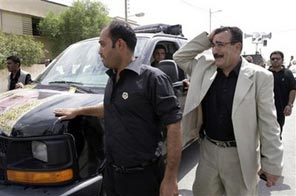Truck bombs kill 16 people in Iraq
BAGHDAD: Two truck bombs struck separate communities north of Iraq's capital on Saturday, killing at least 16 people in the latest attacks that indicate insurgents are targeting relatively unprotected areas as security forces focus on defending the cities.
The Iraqi government is eager to demonstrate it can protect the population following the withdrawal of U.S. combat troops from urban areas nearly two months ago. But a recent series of high-profile bombings that have killed hundreds in both major cities and remote areas has raised concerns Iraqi forces are not up to the task.
Saturday's deadliest attack came at about 8 a.m. when a suicide truck bomber attacked a small police station in the remote village of Hamad north of Baghdad, killing at least 12 people, including six police, said officials from the Iraqi army and police.
Police at a checkpoint attempted to stop the truck, forcing the attacker to change direction and slam into a concrete barrier close to a market, damaging a number of nearby homes and shops, they said. Fifteen people were also wounded in the attack, said the police official.
Hamad is a primarily Sunni village that lies on the edge of Shirqat, a town between Saddam Hussein's hometown of Tikrit and Mosul, which the U.S. military considers to be the last urban stronghold of al-Qaida in Iraq.
The second attack occurred near Mosul in the city of Sinjar, where a parked truck bomb that exploded at about 10:15 a.m. killed at least four people and wounded 23 others, another police official said.
All the officials spoke on condition of anonymity because they were not authorized to talk to the media.
The attack follows a double suicide bombing earlier this month in Sinjar that devastated a cafe packed with young people in northwestern Iraq, killing at least 21 people.
The attacks in Sinjar, a city dominated by members of the Kurdish-speaking Yazidi religious group, come two years after a village nearby was hit by one of the worst insurgent attacks since the 2003 U.S. invasion. Four suicide truck bombers exploded nearly simultaneously in Qahataniya on Aug. 14, 2007, killing as many as 500 Yazidis.
Iraqi forces have stepped up security in Baghdad and other cities in Iraq since an Aug. 19 double suicide truck bombing in the Iraqi capital that targeted the foreign and finance ministries. About 100 were killed.
But remote villages often depend on a small security force for protection. Bombers have been exploiting that vulnerability in villages surrounding Mosul, mainly targeting ethnic minorities.
A double truck bombing on the outskirts of Mosul on Aug. 10 leveled portions of a town and killed 28 people, police said. On Aug. 7, a suicide truck bomber leveled a Shiite mosque north of Mosul, killing 44, authorities said.
Saturday's attacks came as thousands mourned the death one of Iraq's most powerful Shiite leaders, following behind Abdul-Aziz al-Hakim's casket as it began the final leg of a two-day funeral procession to the southern holy city of Najaf from nearby Karbala, another holy Shiite city.
Al-Hakim, who died Wednesday of lung cancer in Tehran, was a powerbroker who help pave the path for the re-emergence of Iraq's Shiite political majority after decades of oppression under Saddam Hussein's Sunni-led regime.
Iranian Foreign Minister Manouchehr Mottaki, who attended a service for al-Hakim in Tehran, was in Baghdad on Saturday for meetings with Prime Minister Nouri al-Maliki.
Also Saturday, Kurdish authorities distributed 850,000 copies of a proposed constitution along with food rations in Sulaimaniyah, one of three provinces in the Kurds' northern self-ruled region. The move is seen as a step in reviving a referendum on the constitution that Iraq's election commission prevented from occurring in July.
Arabs see the draft constitution as an effort by Kurds to expand their region, escalating tension between the two groups that is seen as a major threat to Iraqi stability.






